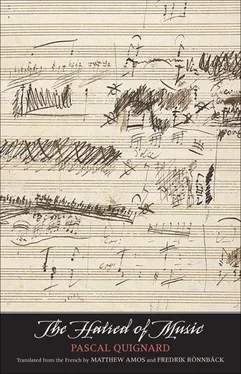
In the fifth century before Christ, Confucius died. He had taught in a small town in Shandong. He was buried at Kong Lin, where his relics were preserved.
There are three of these relics: his hat, his guitar, his chariot.
“Confucius saw life as a perpetual cultural effort, made possible by friendship and frank courtesy, pursued privately, like a prayer, but a selfless prayer” (Marcel Granet, La pensée chinoise , Paris, 1950, page 492).

Like the Augurs in Rome tracing in the air with the tip of their lituus the imaginary space of the temple. The small, comforting square. Examining the directions of the birds’ flights as they spread their wings and projected their songs within the square of this feigned space. My life is a short recipe that I am still perfecting. If I had before me five or six millennia, a sort of feeling dawns within me that tells me that I would be afraid to finish.

Magnets spontaneously attract minuscule bits of iron, cobalt, or chromium. Magnets are like a mother’s smile. A mother’s smile immediately leads to the imitation of a curling up of the lips on the infant’s face. A mother’s smile is like fear: in fear the contagion is called panic. We are all, from the moment of our emergence, before our emergence, from the most extreme infancy, even before our birth, completely mimetic, as reproductive as our mothers were in order to conceive us. We are all completely panicked. Music is like panicked smiles. Every vibration resembling a heartbeat and the rhythm of breathing causes the same involuntary, irresistible, panic contraction. Smiles, which reveal the teeth of tigers, hyenas, and humans, are remnants of panic. We are all defenseless in the face of panic (the panic rock, the mother’s magnetic smile, the panic pole, the mental compass. We are all those little “nickel filings.” We are all those fragments, those contractions before the “bluish rock,” before concupiscence, before violent dread, before death).

How can one look down upon death? Intending to disapprove of it? I disapprove of the Acheron. I disapprove of shadows. Declaring that it is too unjust? That it is illegal? How can one reprimand domination or sickness? Sexuation? How can one say no to terror ? How can one disagree with what is?
The recent religion of happiness turns my stomach.
People who decide to evade dread, I do my utmost to keep my lips from quivering and stretching, I pinch myself until I bleed in order not to laugh.

Surging hums.
Words form chains in breathing. Images form dreams at night. Sounds also form chains as days pass. We are also the object of an “acoustic narration” that in our language has not been given a name, like “dreams.” I will here name them surging hums. Hums surging unexpectedly when we walk, surging suddenly, according to the rhythm of our gait.
Old songs.
Hymns.
Childish and protective refrains.
Lullabies and nursery rhymes. Polkas and waltzes. Sing-along tunes and popular melodies.
Bits and pieces of Gabriel Fauré and Lulli.
Wicker trunks in the dust of the attic in Ancenis, in the acrid smell of the dry, fine dust, in the rays of light concentrated by the narrow dormer windows. Almost like a plaster powder that reverberated off the ancestors’ sheet music, written by lines of Quignards one after the other, all organ builders and organists in Bavaria, in Württemberg, in Alsace, in France, in the eighteenth century, in the nineteenth century, in the twentieth century. Most of their works were written on thick, blue paper. Gold would fall from the only dormer, allowing them to be read, inciting to dust them off, encouraging to hum them. The first rhythm was the heartbeat. The second rhythm was the pulmonation and its cry. The third rhythm was the cadence of walking upright. The fourth rhythm was the assailing recurrence of the waves of the sea breaking against the shore. The fifth rhythm removes the skin from the meat that was eaten, stretches it, attaches it, and attracts the return of the beloved, dead, devoured, desired animal. The sixth rhythm was that of the pestle in the grain mortar, etc. The unexpectedly surging hum immediately informs us about our state of being, about the mood that will govern the day, about the prey that we hail. When taught in music class it was known as the key signature. The hum sets the tone for the space of the body. It distributes the number of sharps and flats that one will have to remember while playing the day’s piece until night’s progression envelops body and face, without in the least muting the world.

The impatience and the irritation when we cannot recognize the name, the title, the lyrics that would allow us to master the resurgent hum. Not knowing the name of what haunts us in sound. Not knowing with what material, around what motif everything will suddenly be “woven together,” will suddenly “coalesce.” Frightened curiosity in regard to this impalpable, acoustic regurgitation, which is after all exactly like that of a mother’s milk or of vomiting. Fit of distress that “gets into” your head and spreads to the respiratory rhythm, seizes your heart, clenches little by little your stomach, that stings your back — like cow’s milk that “turns” upon contact with a suddenly adjacent heat. Suffering from words that fail, that are absent as sounds, that are the Absent, that remain absent on the “tip” of the tongue. On the “promontory,” on the problèma of language.
On the lingua of language.
Before a sacrificer throws the scapevictim of the Acoustical into the ocean, which is to say into affect: the-man-who-is-the-sacrificed-of-language. The man who is the obeyer .

I am like the thief in the ancient Indian tale who plugged his ears when stealing bells.

I know only four oeuvres in which joy was considered as the highest human quality: Epicurus, Chrétien de Troyes, Spinoza, Stendhal. At the end of their adventure, Chrétien de Troyes’s heroes receive Joy as their reward. It is still not clear what that might have been. Joy was either a magic horn that forces one to dance, or a horn that makes one drunk, or a game, or pleasure. Jocus is the game of jubilation. To be speechless with joy at the end of language, at the denouement of the adventure, opening oneself to the silence or to the music of the horn that forces the soul into silence, this is the aim of authors as it is the prey of heroes.

Chrétien de Troyes wrote William of England . During the reunion banquet, William of England did not even pay attention to his wife: he immediately lost himself in “thought.” He sees a stag. He pursues the sixteen-pointer. He suddenly cries out: “Hu! Hu! Bliaut!” The sequence is purely acoustic and it is so loud that the scream tears the king away from the vision from which it came. It is only after the scream to his dog and directed toward the stag that he can recognize his wife’s body and ask her about her life since they parted, more than twenty years earlier.
Читать дальше













